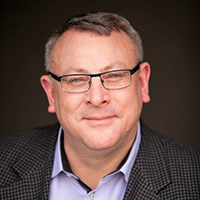Biogen Leads Fight Against Supply-Chain Criminals

By Louis Garguilo, Chief Editor, Outsourced Pharma

Lee Spach, Director, Global Product & Supply Chain Security, Biogen, owns a down-to-earth speaking style that’s positively disarming. What he has to say about the safety of our physical drug supplies, though, puts you back on the alert. For example, from our recent Outsourced Pharma Boston conference:
“There are about 35,000 online pharmacies in the world. Ninety-eight percent of those online pharmacies are fake. They don’t follow any regulatory or legal requirements. These fake websites are transacting billions of dollars annually in drug sales. The drug products are stolen, diverted, or completely counterfeit. The products sold start at the API level, and go all the way to commercial and other finished goods.”
Spach produces this stunning paragraph without notes. After a listener-friendly pause, he continues:
 “We are not talking about just some thread in our industry or markets that you can segment out. It is pervasive. Some of the latest Intel from the FBI says that entering into the pharmaceutical counterfeit arena, you can expect your return on investment to be about 39,000 percent. Got that? Thirty-nine thousand dollars for every dollar you invest in this activity.”
“We are not talking about just some thread in our industry or markets that you can segment out. It is pervasive. Some of the latest Intel from the FBI says that entering into the pharmaceutical counterfeit arena, you can expect your return on investment to be about 39,000 percent. Got that? Thirty-nine thousand dollars for every dollar you invest in this activity.”
And finally: “If you look at in the United States, 56,000 people died last year from opioid overdose. Where are our government resources focused? On the opioid crisis. What do you think the criminal organizations are doing? They’re shifting.”
That “shift” is hitting many pharma companies and various drug lines. Spach gives the (sad) example of a Biogen product called Spinraza (nusinersen), a treatment for spinal muscular atrophy for infants born with the disease; multiple fake websites have been discovered.
Fighting Back
To fight back, and perhaps different from some of its peers, Biogen implemented an approach of centralizing its physical drug security and related activities. It created the “Global Security Operation Center” at the company’s headquarters in Boston. This is a 24/7–365, fully manned operation that monitors all the intelligence and activity for Biogen’s global physical assets, its employees, affiliate offices, CTV cameras … even down to facility temperatures where product is stored.
The operation center serves as the main triage, and first point of contact for product supply-chain security capabilities, for the “prevention, detection, and response mechanisms Biogen has put in place for both internal and external locations.”
“We own the product from API to the point of consumption at the patient level,” says Spach, and we should be determined to take responsibility for its physical safety.
Spach looks around the conference room. It’s clear the pronoun “We” represents all drug sponsors – and in practice their contract manufacturing partners. Our industry has become entangled with a web of criminality, from those opiods to drugs for infants, and we need to do something about it. But what?
Upside Down Risk-Reward Ratio
Biogen actively monitors – and pursues – nefarious activity it uncovers anywhere in the world. It performs “in-market sampling.” Spach explains: “We buy products off these websites all the time: First, we determine if they are in fact real products. If so, we look into how they get into the gray- or diverted-market. Number two, if the drugs are counterfeit, then we have a whole multitude of things that we can set out to do.”
With the drug Spinraza mentioned above, Spach says: “Counterfeiters saw this is a very high-profit, low-volume opportunity … and they think along the lines of the chances to get caught are slim to none. We are changing those odds. However,” he adds unappreciatively, “the legal penalties for these criminals are negligible relative to if you get busted with heroine or something like that on the street.”
Let’s stay on this point for a moment. Ron Guido, President, LifeCare Services LLC, an industry leading authority on this subject of physical supply chain theft, made this comparison of the punishments meted criminals:
“The average bank robbery nets $1,500, and you're risking going into a bank with all kinds of cameras, probably an armed security guard. If you get caught, you go away for a long time. On the other hand, the average truck theft of one of our drug products is somewhere in the neighborhood of $2 million in value. No guns, no security – the truck drivers are probably having their dinner in the local diner … and if you do get caught, the prison time is usually minimal.”
So while the problem of illegal drug activity within our supply chains is being addressed at an elevated level by individual biopharma companies such as Biogen, why do we still have these lenient penalties for drug thieves? This is a question for our entire society – most immediate our judges, politicians and legislators.
Perhaps some changes are on the way. At least in one highly publicized case in 2016, the ringleader caught in a $60 million pharmaceuticals heist of Eli Lilly drugs in Enfield, Connecticut, and similar million-dollar warehouse “jobs” in four other states, was sentenced to eight years in prison in a U.S. District Court.
Nonetheless, we all should get the word out about flipping, on state and federal levels, the reward-to-risk ratio for counterfeiters and drug thieves.
Maintain A Sense Of Equilibrium
Industry leaders like Spach and Guido – and Chirag Shah of Sanofi featured in part one of this article – deserve a great deal of credit for their willingness to accept speaking engagements, play roles as members in groups such as the Pharmaceutical Cargo Security Coalition (PCSC), fully devote themselves to catching these drug thieves, and for spreading awareness and best practices throughout the biopharma industry.
“Fundamentally,” says Spach, “You’ve got to think like a bad guy to live in this world.”
Think like a bad guy, but be a good communicator to the rest of us. In fact, Shah, Spach, and Guido know the challenges are escalating. The burden to turn this around falls first on the brand owners, who need to do take actions such as adopting the newest technologies to decrease physical supply risk. Those actions and efforts obviously include every affiliated CDMO and other service provider participating in our drug supply chains. The burden also falls on beefing up health authorities, custom officials, and law enforcement to track down, and close down, the perpetrators.
But again, a major contributing factor to all this are those lenient courtroom sentences. The criminal element, Guido stresses, “are organized, and smart.” They can ferret out the easier targets, and they understand even if caught – still a rarity we are told – the penalties are not real deterrents. That’s simply an unacceptable situation. The consequences of stealing life-saving drugs should be dire for those we try.
